Public Opinion: Is Israel Independence Day a Holiday?
Do Jewish and Arab citizens of Israel see Yom Ha'atzmaut as a holiday? Do perceptions among Jews vary depending upon level of religiosity or position on the right-left political spectrum? Find out in this Mini-Survey from IDI's Guttman Center.
Yom Ha'atzmaut—Israel Independence Day—is a national holiday. The Independence Day Law of 1949 states that "The 5th of Iyar... will be celebrated every year as a national holiday." Yet in a fractured and polarized country like Israel, the complex relationship between the citizens and the state is also reflected in how people see and commemorate the day on which the State of Israel was declared. For some people, Independence Day is a holiday, for others it is a weekday, while for others still, it is a day of mourning.
A National Holiday? It Depends on Nationality
A survey conducted by the Guttman Center in the days leading up to Israel's Independence Day in 2014 found that 68% of Arab citizens of Israel do not see Independence Day as a holiday while only a quarter (24%) see it as a holiday (the rest did not know or did not answer). As expected, an overwhelming majority of the Jewish public (87%) sees Independence Day as a holiday.
Figure 1: Do You See Israel Independence Day as a Holiday?
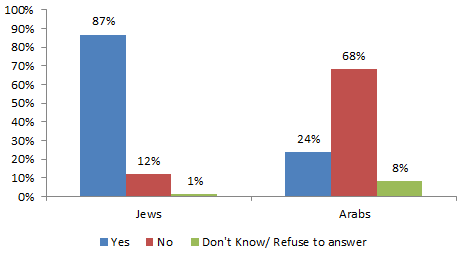
Is Yom Ha'atzmaut Considered a Holiday Even by Religious Jews?
When analyzing the perception of Israel Independence Day among Jewish respondents who define themselves as having different levels of religiosity on the religious-secular spectrum, it emerges that in all groups except for the ultra-Orthodox, a large majority sees Yom Ha'atzmaut as a holiday. The majority of ultra-Orthodox (Haredi) respondents (63%) does not see Independence Day as a holiday (Figure 2). However, the fact that about one-third of those who define themselves as Haredi see Independence Day as a holiday may strengthen the hypothesis that a considerable share of ultra-Orthodox Jews in Israel are beginning to identify with the State of Israel.
Figure 2: Do You See Israel Independence Day as a Holiday?
(By self-definition as religious/secular; Jewish sample)

A Holiday for Both the Right and the Left
An analysis of the relationship between the position of respondents on the right-left political-security spectrum and their views of Independence Day indicates that in the total sample, the perception of Independence Day as a holiday is lower among respondents who define themselves as on the left than among respondents who define themselves as on the right (Figure 3). This is due to the fact that a high percentage of Arabs, most of whom do not see Independence Day as a holiday (as mentioned above), define themselves as left wing. An analysis of the Jewish sample only, however, indicates that a high rate of respondents in all groups see Independence Day as a holiday (over 88 %), and it is actually the group that defines itself as right wing that has a lower rate of perception of Yom Ha'atzmaut as a holiday (Figure 4). The reason for this is that many ultra-Orthodox Jews, two-thirds of whom do not see Independence Day as a holiday, identify themselves as being on the political right. Indeed, when the responses of the Jewish sample are analyzed with the ultra-Orthodox responses excluded, the rate of recognition of Independence Day as a holiday is very high (91%) and is similar among both the right and the left.
Figure 3: Do You See Independence Day as a Holiday?
(By self-definition on the right-left political-security spectrum; total sample)
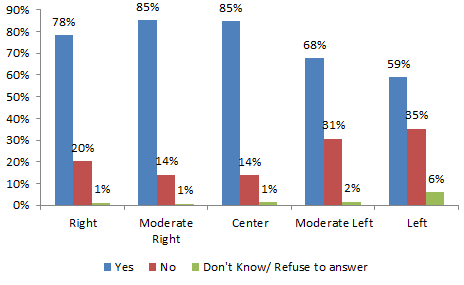
Figure 4: Do you See Independence Day as a Holiday?
(By self-definition on the right-left political-security spectrum; Jewish sample)
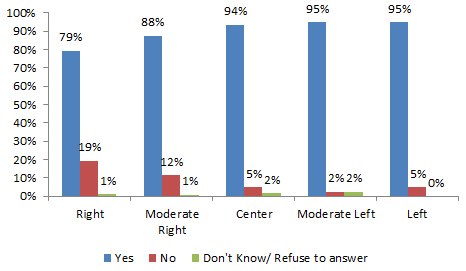
A Holiday for all Ages?
The survey also found that adults tend to see Independence Day as a holiday more than younger people (95% of respondents aged 45 and over, as compared to less than 70% of respondents aged 18–44).
Figure 5: Do you see Independence Day as a holiday?
(By age; total sample)
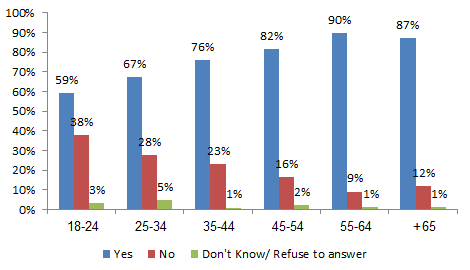
Satisfaction and Celebration
In general, it was found that respondents who expressed satisfaction with Israel's achievements are more likely to see Independence Day as a holiday; the less satisfied respondents are with the achievements of the state, the less likely they are to see Independence Day as a holiday.
Figure 6: Do You See Yom Ha'atzmaut as a Holiday?
(By degree of satisfaction of Israel's achievements in its 66 years; total sample)
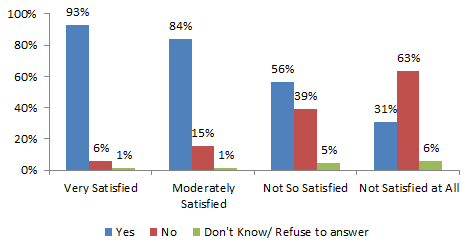
Note: The survey was conducted by telephone by the Midgam Research Institute, on April 28–29 2014. The survey included 600 respondents, of whom 500 respondents were Jewish and 100 were Arab. The survey was conducted in Hebrew, Arabic and Russian. Responses were weighted so that the total sample constituted a representative sample of the adult population of Israel aged 18 and over. The maximum measurement error for the entire sample is ±4.1%.
- Tags:
- Arab Society,
- Identity,
- Judaism and Democracy,
- Minorities,
- Nation-State,
- Religion and State,
- Surveys and Polls,
- Ultra-Orthodox,
- Arab citizens of Israel,
- Arab-Jewish relations,
- Citizenship,
- Civil society,
- democracy,
- public opinion,
- Zionism,
- Viterbi Family Center for Public Opinion and Policy Research
